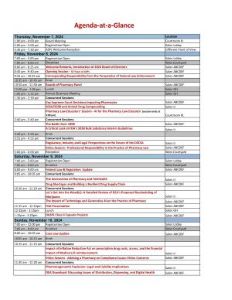Back
Pharmacogenomic Explosion: Legal and Liability Implications
Sunday, November 10, 2024
11:20 AM – 12:20 PM MT
Location: Salon IJ
CE: 1

Anthony P. Morreale, PharmD, MBA, BPCS, CPEL, FASHP
CEO Morreale Consulting
Morreale Consulting
La Jolla, CA, United States
Primary Presenter(s)
Integration of pharmacogenomic (PGx) testing into clinical practice has accelerated in select practice areas, moving it from a novelty to a standard part of patient care. That’s generally a good thing as it has proven in those areas to improve clinical outcomes. However, as PGx testing becomes a standard of care, failure to implement it could lead to instances where care may not be optimized, raising potential malpractice issues. There are a growing number of pharmacogenomic based legal cases that have been settled or resulted in significant financial judgments that deserve focus for all in the pharmacy and legal professions. This presentation will focus on the rapid advancement of the science and its impact on prescribing and managing drug therapy and the consequences of ignoring pharmacogenomic evidence that is now present in well over 300 FDA approved medication prescribing information documents.
Learning Objectives:
- Understand the growth curve of pharmacogenomics and its liability implications for prescribers and pharmacists.
- Describe the interplay between the growth of Pharmacogenomic testing and the linkage to medical and pharmacy standards of practice
- Describe specific examples of medical legal cases involving pharmacogenomic factors and their implications to future cases.
- Summarize actions that practitioners and organizations can take to minimize medico-legal risks associated with the emergence of pharmacogenomics

